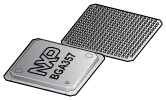● 32-bit version of the CPU32 core (fully compatible with CPU32)
● Up to 32-bit Data Bus (Dynamic Bus Sizing for 8- and 16-Bits) + 32 Address Lines
● Complete static design (0-33 MHz Operation)
● Slave mode to disable CPU32+ (allows use with external processors)
● Multiple QUICCs can share one system bus (one master)
● MC68040 companion mode allows QUICC to be an MC68040 companion chip and intelligent peripheral (29 MIPS at 33 MHz)
● All QUICC features available in slave mode
● Memory controller (eight banks)
● Contains complete Dynamic Random-Access Memory (DRAM) controller
● Glueless interface to DRAM Single In-Line Memory Modules (SIMMs), Static Random-Access Memory (SRAM),
● Electrically Programmable Read-Only Memory (EPROM), Flash EPROM, etc.
● Boot chip select available at Reset (options for 8-, 16-, or 32-bit memory)
● Special features for MC68040 including Burst Mode
● Four general-purpose timers
● Four 16-bit timers or two 32-bit timers
● Two Independent DMAs (IDMAs)
● System Integration Module (SIM60)
● Bus monitor
● Breakpoint logic provides on-chip H/W breakpoints
● Spurious interrupt monitor
● External masters may use on-chip features such as chip selects
● Periodic interrupt timer
● On-chip bus arbitration with no overhead for internal masters
● Low power stop mode
● IEEE 1149.1 Test Access Port
● RISC Communications Processor Module (CPM)
● Many new commands (e.g., Graceful Stop Transmit, Close RxBD)
● Supports continuos mode transmission and reception on all serial channels
● 2.5 kbytes of dual-port RAM
● 14 Serial DMA (SDMA) channels
● Three parallel I/O registers with open-drain capability
● Each serial channel can have its own Pins (NMSI mode)
● Four baud rate generators
● Four SCCs
● Ethernet/IEEE 802.3 optional on SCCs 1-2@25 MHz, SCCs 1-3@33 MHz
● HDLC Bus
● Universal Asynchronous Receiver Transmitter (UART)
● Synchronous UART
● Asynchronous HDLC (RAM microcode option) to support PPP (Point to Point Protocol)
● Two SMCs
● UART
● Transparent
● General Circuit Interface (GCI) controller
● One SPI
● Time-Slot assignor
● Supports two TDM channels
● Parallel Interface Port (supports fast connection between QUICCs)


